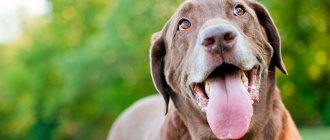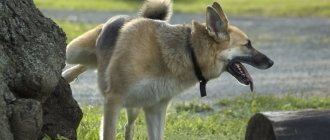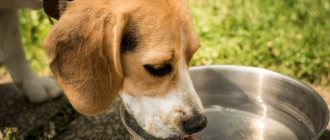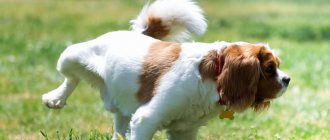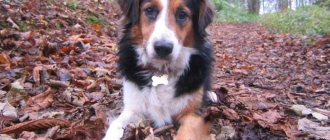Intrigued by how your dog yawns? Most of us know what yawning is in humans, but when it comes to yawning in dogs, we can sometimes feel a little stumped. Why does my dog yawn? Do dogs yawn when they are tired, or is it something else? For what reasons do dogs yawn? To better understand the mechanisms behind dog yawning, it is necessary to learn more about what yawning actually entails, what causes yawning and, most of all, what a yawning dog is trying to tell us, which can sometimes be very important!
About the physiology and psychology of four-legged friends
Experienced dog breeders who pay due attention to their pet quickly learn to understand its facial expressions. And even a yawn can have different shades, expressing boredom, uncertainty, laziness. Yawning can have a certain character and mean the following:
- confident yawn - in this case, the dog that has taken a dominant position yawns confidently, with a sound. You can catch a negative subtext in this;
- active yawning when the dog is in a relaxed position - the pet is happy with the current situation, nothing bothers him, he is confident in himself and his abilities - there is no reason to strain;
- exciting yawn - dogs, in fact, are quite emotional animals, and a lot of reasons can cause their excitement - joy, anxiety, curiosity, impatience, fear... In any case, it is noticeable that the animal is worried - shifts from paw to paw, actively moves its tail, lifts or flattens his ears and has an interested look;
- warning yawn - while yawning, the dog reveals a row of snow-white teeth with powerful fangs - this is an unobtrusive way to remind that you should not get involved with such a formidable opponent, since the consequences can be very dire.
For some people, yawning brings peace, calm, and relieves anxiety and stress. But the majority do not pay attention to this reflex at all and do not note how yawns affect their overall well-being.
This reflex can only be suppressed if a special hormone is released into the blood during a stressful or life-threatening situation. When the acute phase passes, a person feels general weakness, lethargy and decreased performance - these are the consequences of hypoxia - lack of oxygen in brain cells.
Most often, yawning is still associated with sleep and rest. During sleep, the pet rests, but its immune system is actively functioning, and intensive cell division also occurs. Almost all organs except the brain work in slow motion; the heartbeat, blood flow rate and breathing become slow.
If the dog suddenly wakes up, then all systems turn on as if at the request of a “panic button”. The body's forces are redistributed, which provokes oxygen starvation of the brain and frequent yawns. When the dog wakes up on its own, it begins to stretch, lick itself and slowly yawn, thus preparing the body for the upcoming activity.
It is worth noting that puppies tend to yawn more often than adults, even if they behave actively and energetically. Indeed, babies are cheerful, positive and full of energy, so they need to consume a large amount of calories.
But the resources of the puppies’ body are distributed in such a way that the baby gets tired quickly, sleeps a lot and grows intensively. This is necessary for the harmonious development of the animal, so that all systems and organs receive adequate nutrition.
Dogs are quite sociable animals that are able to adapt to the rhythm of life of the family in which they live. And even if the pet’s biological clock hints that it’s time to sleep, and the dog begins to actively yawn, he often waits until the owner goes on vacation. Such behavior can also signal oxygen starvation of the brain, but is not associated with a stressful situation.
In dogs that live according to a routine, physiological rituals occur every day at the same time. You can verify this by more closely observing the behavior of your four-legged friend over several days.
Tags
yawning dog is trying to your dog is yawning udo yawning in Breed Cat Breeds
yawningbreedstressarticlesandreasonneedtiredbloodpeoplesleepwecananimalsdoactivitiesyawncommentevenrestmoremorejustthetailmanyauthorsinceadvertisementreflexespeciallybeginsmorepressurehealthsignsindicatesforcesillnesssharevetresponseinterestingpublishedquicklyfullworkedownersloginrequestcarefor examplemoreoftensubstancesopportunitiesquestion then allows the news body history system
Yawning in the wild
If you look from the outside at the life of wild dogs, you will notice that they spend a lot of time resting, accumulating strength for the upcoming hunt. Before going out, the dog does a warm-up by stretching, dispersing blood through all vessels. In addition, during preparation for the hunt and during the process, the dog begins to breathe through its mouth, beats itself with its tail, forcing the body to work to the limit.
Even from their wild counterparts, dogs began the habit of stretching and yawning, showing their superiority, strength and power. Dogs behave the same way if they want to cheer up. In the wild, a dog can jump up and run if the situation requires it. For such overloads, an additional reserve is needed, and this is a high dose of oxygen. Before sleep, as well as after, yawning supports the full functioning of the brain.
Your dog's behavior
Yawning: We do it when we are bored, doing tedious activities or tired, and sometimes we also do it when we see other people yawning, hence its contagious nature.
Yawning involves opening your mouth wide, taking a deep breath of air, and then exhaling. But why does yawning happen at all? What happens from a physiological point of view? In nature, fish, snakes and even babies yawn, and scientists have wondered about its purpose for many years and have come up with several theories.
One theory is that yawning occurs when there is a lot of carbon dioxide in the blood. Thus, yawning is considered a way to increase oxygen consumption, given that it entails taking a deeper breath compared to normal breathing.
Another theory is that yawning helps relieve tension built up in the jaw, tongue and throat, and therefore produces a pleasant sensation.
And then you have yawning, which comes from simply watching or hearing someone yawn. Have you ever felt like yawning while reading this article? If so, let's hope it's not out of boredom!
© shutterstock
When is yawning natural and when is it forced?
Every person knows that the urge to yawn can be suppressed, but it is not controllable. If a yawn occurs, then it cannot be stopped, since thanks to this reflex the full functioning of the brain is carried out. Of course, the body needs all organs, so after large volumes of air enter the lungs, the heart beats faster, actively distributing oxygen throughout all systems.
Frequent yawning of a weak, exhausted animal can signal a decrease in hemoglobin, an increase in the erythrocyte sedimentation rate, or their death. A change in these indicators indicates hypoxia of the body.
In the following cases, the owner need not worry if his four-legged friend begins to yawn more often than usual:
- The dog is overtired - after running around in nature, frolicking with other dogs, or after intense work on the training ground, the pet feels the need to rest. His body is saturated with oxygen, and sleep will only benefit the animal.
- The dog is tired, but does not have the opportunity to rest - service and working dogs cannot sleep when the body needs it, because sometimes their activity requires maximum activity for a long time. Thanks to yawns, the body mobilizes strength to support the dog for subsequent activity.
In the body of an excited or extremely stressed animal (in the hypothalamus), adrenaline and other stimulating substances begin to be intensively produced. They support systems during such a difficult period, but after their breakdown toxic components are formed. And when a dog yawns, his brain activity not only accelerates, but his bloodstream is also cleared of harmful substances faster.
In the following situations, a yawn or two also has a serious meaning for the pet:
- When in an unfamiliar environment (visiting, transport, new housing, etc.), a yawn makes it clear that the dog is excited and worried.
- After a meal , the dental apparatus of dogs is designed in such a way that they cannot chew food, the dog swallows pieces of food, and when they enter the stomach, they begin to be digested. The intestinal mucosa absorbs nutritional components and then saturates the blood with them. This important process requires some time, and it is desirable that the dog is calm - the body needs additional strength. The pet’s desire to rest and sleep after eating is natural; in this case, the body will be able to extract and absorb the maximum of useful substances.
If yawning is associated with pathological processes, then it is almost impossible to identify them without additional symptoms. To detect health problems, it is necessary to evaluate the full clinical picture of the disease. That is, it is impossible to say that the dog is sick only because of frequent yawns, which are an unconditioned reflex.
When the pet’s condition still worries the owner, it is recommended to do the following:
- examine the fur, mouth, eyes, ears of your four-legged friend - pay special attention to the color of the mucous membrane;
- measure your body temperature, normally it is 37.5-38.5°C;
- offer your pet a treat - loss of appetite may be a sign of a serious illness;
- observe the dog’s behavior - if he reacts poorly to external stimuli, sleeps most of the time or lies down, constantly yawning, then you should consult a veterinarian.
With the help of long-term observation, the owner can discover a couple of reasons for the pet’s frequent yawning, which laboratory tests and various diagnostic measures are not able to identify.
Meteor dependence
The animal’s body reacts to sudden changes in atmospheric pressure and changes in weather conditions. Most often, dogs with brachycephalic syndrome are prone to this phenomenon, since by their nature they have problems with breathing, and therefore with blood pressure. In addition, in some adult Chihuahuas the fontanel does not completely close.
Possible health problems
If the owner can rule out psychological factors as the cause of constant licking, then it is necessary to check the dog's health as thoroughly as possible.
Digestive system
Increased salivation or dry mucous membranes, causing the need for frequent licking, can be caused by diseases of the digestive system or dietary errors:
- nausea and drooling due to poisoning or improper diet;
- gastritis;
- heartburn;
- severe diseases of the gastrointestinal tract - tumor, hernia.
In case of diseases of the digestive system or poisoning, in addition to increased secretion of saliva, other symptoms are present:
- vomit;
- diarrhea;
- increase or decrease in body temperature;
- convulsions.
Oral cavity
Problems with teeth and gums are another provoking factors:
- foreign objects stuck in teeth or esophagus;
- jaw dislocation;
- loose teeth;
- bacterial infections of the oral cavity - stomatitis, gingivitis, caries.
All these ailments cause discomfort, pain, and copious amounts of saliva, which dogs constantly try to swallow.
Allergy
It happens that a change in diet, unusual or incorrectly selected food causes food allergies and hypersalivation. In case of allergic reactions, in addition to increased salivation, symptoms such as:
- itching;
- skin rashes;
- swelling of the mucous membranes;
- discharge from the nose, eyes.
Salty, spicy, fried foods and low-quality food should be excluded from the dog’s diet. If necessary, antihistamines should be used.
Other diseases
Liver diseases, kidney and liver failure, urolithiasis are quite serious disorders that can become causes that provoke thirst and the need to lick one’s lips all the time.
What to do
If a dog yawns frequently under certain circumstances, the owner should take the following steps.
- Entertain the dog, give it attention and calm it down.
- If the dog finds itself in an uncomfortable situation or is irritated by something, it is necessary to support the pet and distract it from negative factors. The dog can be distracted using commands or games.
- Adapt your pet to stimuli. If a dog is irritated by loud noises, it is necessary to develop a calm reaction to this irritant. To do this, you can use a game or treat to reinforce your pet's positive behavior.
- Do not show intrusive attention to your pet. Make sure that he is not irritated by displays of affection.
- If the cause is illness, you should immediately contact a veterinarian. If there are problems establishing a diagnosis, you need to have the dog examined.
Causes
The reasons for yawning can be related to both the psychological and physical well-being of the dog. As a rule, yawning is associated with the pet’s mood, but sometimes it can indicate a deterioration in the animal’s health. What makes a dog yawn?
- Boredom and loneliness. This reason is the most common. A dog yawns when it needs more attention from its owner. Thus, the dog shows its need to communicate with the owner.
- Tension and anxiety. Yawning may mean that the dog is excited or scared. Often a dog yawns when it is irritated by something from the external environment. This may be due to other dogs, loud noises or unpleasant actions of the owner. This behavior can be observed during a visit to the veterinarian or groomer.
- Nervous situation. A dog may lick itself more often at exhibitions or competitions, since this situation is not familiar to the animal.
- Strong hugs and cuddles. Dogs do not like intrusive attention, so yawning may be a consequence of irritation from excessive displays of affection.
- Loss of balance. When a small dog or puppy is picked up from the floor, it may yawn after losing its balance.
- An attempt to fill the body with energy and cheer up.
- Diseases. If a dog yawns convulsively, this may be caused by illness. In this case, it is necessary to observe the dog’s behavior, because other symptoms should soon appear.
